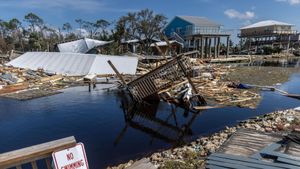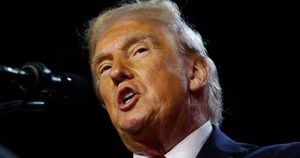Following intense political turmoil triggered by violence during football clashes and the resignation of a key cabinet member, the Dutch coalition government has managed to stay afloat. This incident has raised significant concerns about the state of affairs and relationships within the country's political framework.
On November 7, 2024, chaos erupted during and after Europa League matches involving Ajax Amsterdam and Israeli team Maccabi Tel Aviv, leading to violent confrontations. Reports indicated aggressive interactions between local Dutch fans and visiting Israeli supporters, resulting in injuries and heightened tensions within the city of Amsterdam.
What ensued from this violent episode was not only immediate public outcry but also significant political fallout. Nora Achahbar, the Dutch State Secretary for benefits and customs and member of the centrist New Social Contract (NSC) party, became embroiled in the controversy which erupted from the aftermath of the clashes. Achahbar's resignation was prompted by heated cabinet discussions over alleged racist remarks made about immigrants during these emergency meetings convened to address public safety and national unity.
"With pain in my heart, I have to announce today I will not continue this task," Achahbar remarked as she delivered her resignation. She stated her decision stemmed from the polarizing attitudes she witnessed among her colleagues and expressed her belief these behaviors endangered the social fabric of the nation.
Prime Minister Dick Schoof sought to navigate this crisis, emphasizing the government's commitment to remain united. "There was and is no racism in the government," he stated, affirming the coalition's intent to continue governing together, albeit under strained circumstances.
The government's stability relies heavily on the coalition consisting of the NSC, the far-right Party for Freedom (PVV), the People's Party for Freedom and Democracy (VVD), and the Farmer-Citizen Movement (BBB). Achahbar's NSC party holds 20 seats, which are integral to the coalition's majority of 88 seats within the 150-member lower house of parliament.
The tension and resentment stirred by the football violence were exacerbated by remarks made by Geert Wilders, leader of the PVV, who blamed Moroccan communities for instigandering the confrontations. Wilders publicly claimed, "We saw Muslims hunting Jews," stirring additional controversy.
Criticism emerged from various fronts following the event; opposition leader Frans Timmermans from the Green-Left Socialist party condemned the government's culture as being rife with racism. "This government is not for all Dutch people," he asserted, highlighting the divisive dialogue among the ruling coalition.
Calls for accountability reverberated through the political spectrum, leading to pledges from authorities to address issues surrounding antisemitism and public safety. Prosecutors are continuing investigations to identify those responsible for the violence, with no clear explanations yet available for the escalation of the clashes evident during the football match.
This political crisis has unveiled underlying societal tensions ranging from immigration issues to public safety and national identity, prompting analysts to reflect on the future of Dutch politics. While Schoof and remaining coalition members maintain their stance to uphold unity, the atmosphere remains charged due to the unyielding divide manifesting within the society.
Moving forward, the focus rests heavily on the Netherlands’ ability to reconcile differing perspectives. The events following the football violence could either galvanize more division within the current administration or lead to necessary reforms aimed at addressing the public's concerns about immigration, safety, and national identity. For now, the government has survived this round of turmoil, but it remains to be seen what will emerge from the shadows of the recent crisis.



